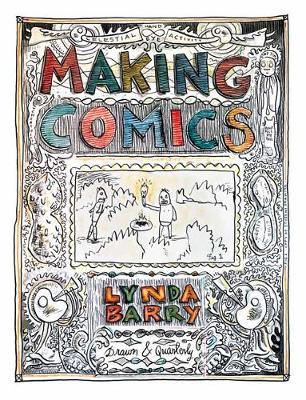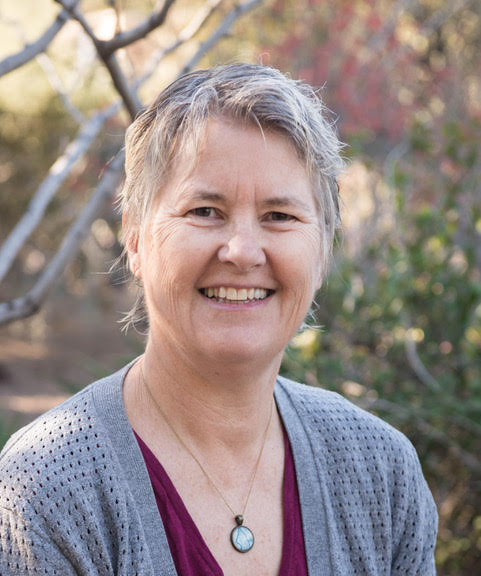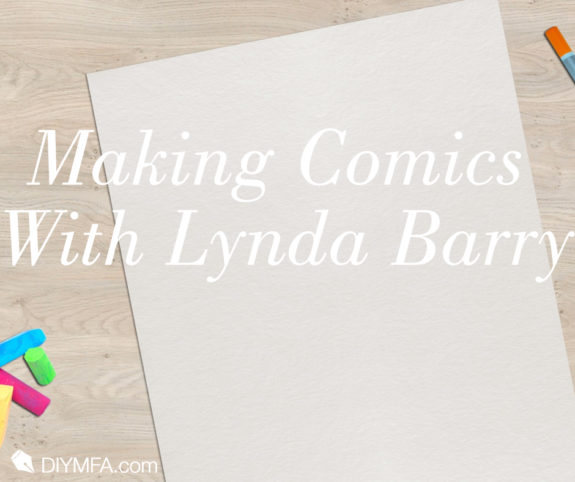A highlight of my sabbatical last year was attending a Lynda Barry Writing the Unthinkable Workshop. Taking a class with this amazing cartoonist has been on my bucket list for years. Every few months I’d ponder how I could pack off to Wisconsin for a summer or semester to take one of the cartooning classes she teaches at the University of Wisconsin, Madison, where she’s been a professor since 2013.
As life rolls onward, a one-day workshop in a strip mall in Hollywood seemed the closest I’d ever get, so I talked my husband into driving me to California for the weekend. He went to see the Guggenheim Museum garden. Thought it was meh. While I spent the day in the same room with Lynda Barry, recent MacArthur genius award winner and amazing cartoonist/philosopher. In the workshop, we wrote and doodled in composition notebooks, drew ourselves as Batman. We outlined our hands, made short comics about our lives, drew spirals while listening to stories. Always there was music playing. It was glorious.
Making Comics, by Lynda Barry

The workshop satisfied my long-held desire to be taught in person by Lynda Barry. But what if you can’t even manage a weekend? Life is a full-time job and finding time for road trips isn’t always doable. Not to worry. Her new book, Making Comics, to the rescue! This gem of a notebook creates a virtual Lynda Barry, especially if you draw, write and listen to happy old-school songs while reading it. You can even watch her YouTube timing videos in advance, to get a sense of her spoken voice.
Released in November 2019, the book reads like a hybrid compendium—part lesson plans, part personal narrative, part educator’s notes on how to reach students, part wisdom on being human. All in Barry’s loving and approachable style.
Anyone Can Draw
I live and teach by the principle that anyone can draw, a truth that rejects the myth that drawing is an exclusive right for only those who “draw well.” Barry clearly aligns to this freeing and open way of engaging with both drawing and storytelling. In the book, as in her workshop, she speaks a lot about 4-year-olds, how they still live in a world where words and drawings are the same act, or at least not separate from each other. Words and images work together to tell stories.
“I’m always trying to picture the story,” she said during the workshop. That’s the magic of mingling words and images. They come close to how we experience the world before we learned to compartmentalize. To self-censure. To declare, “oh, I can’t draw. I’m not an artist.” They help us shed the rigid frames in our adult minds that we built to keep us safe, but that so often wind up confining our imaginations.
Making Cartoonists
Lynda Barry is a captivating educator with a gift for bringing reluctant drawers into the comics universe. Two of her students, KC Councilor and Ebony Flowers, both doctoral students at UWM when they took Barry’s class, went from not drawing to publishing in comics form. In Flowers’ acknowledgements for Hot Comb (Drawn & Quarterly, 2019), a collection of hair-related stories, she says of Barry: “You taught me how to discover the writing in drawing and the drawing in writing. You turned me into a cartoonist and education researcher.” Flowers earned a PhD in Curriculum and Instruction and wrote/drew her dissertation, before publishing Hot Combs.
Being mentored by Barry is transformative. For KC Councilor, transformation is the main theme of Between You and Me (Drawbridge Press, 2019), a graphic memoir of his gender transition. The book includes a letter to readers that begins, “I was more than 30 years old before I started drawing again…It is no exaggeration to say that I wouldn’t be transitioning, wouldn’t be finding my way back to home in this body if it weren’t for drawing.” Councilor earned a PhD in Communication Arts and is now an assistant professor at Southern Connecticut State University.
Why Cartoons and Comics?
Making Comics begins with Barry’s reflections on her experiences drawing with 4-year-olds and on their grasp of blended language that is foundational to how she teaches. She notes “This language moves up through the hand and into your head. Young children are native speakers.” (p. 8). The book moves into the materials and methods developed during her many years of teaching comics classes. Each page is a place filled with Barry’s funny characters. I love the cartoon art of Medieval manuscripts and see parallels in Barry’s drawings, especially in this new book. In her work and that of Medieval scribes, drawings are not decoration or illustration. They live on the page and engage with the words that share this papery world with them. Creating a living place on the page is the greatest magic of comics form and cartooning.
This morning I read in Jane Alison’s book Meander, Spiral, Explode: Design and Pattern in Narrative (Catapult, 2019) that neuroscientists describe reading as “a felt motionless movement through space” (p. 5) and that this leaves a trail of sorts in your brain. Reading words creates a space in your mind where you experience this motionless movement. In reading any of Lynda Barry’s books I can see this motionless movement. It leaps from the page directly, without needing to be processed in the language quarters of my mind. The drawings activate the page. They vibrate. They invite the reader to enter the page, a place that is always much bigger than the sheets of paper a book is printed on.
Teaching and Learning by Doing
As I read Making Comics, I recognized some of the exercises from the Writing the Unthinkable workshop I had taken. After the workshop, I approached Barry to ask about using some exercises in my classes. She gave me a big full-faced smile and said it was all open-source, free to share with any and all. I plan to use some of the assignments in a class I created on hybrid stories of place. Now I have a more complete resource to draw from in developing exercises.
Making Comics is an extended invitation to learn and teach from Lynda Barry’s experience and expertise in finding the place where words and images merge into stories, the kind of expansive and surprising stories that 4-year-olds are fluent in telling. The kind of stories that grown-ups can discover again and that are essential in navigating the complex world of being human. Making Comics can be worked through solo or as a group, in a class or book club or gaggle of friends eager to try drawing.
Drawing is its own reward and I encourage you to give it a try. As Barry writes at the close of the book: “Everything good in my life came because I drew a picture. I hope you will draw a picture soon.”

Rebecca Fish Ewan, poet/cartoonist/writer and founder of Plankton Press, teaches in The Design School at Arizona State University. She grew up in Berkeley, California, and now lives in Arizona with her family. Her cartoon/free verse memoir, By the Forces of Gravity, was published in 2018 through Books by Hippocampus, also publisher of her new book on drawing for writers that releases June 2020! You can connect with her at rebeccafishewan.com or on Instagram.







